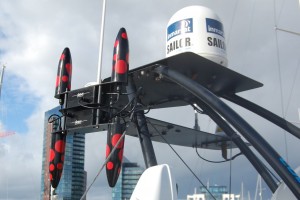Sport Relief sailing challenge stays connected with Livewire RazorLink

Cellular and satellite networks on-board the VOR65 used for the Hell on High Seas challenge were aggregated using RazorLink.
For a recent charity effort that formed part of the latest Sport Relief initiative, involved the support of BT and yielded extensive coverage on BBC TV and radio, six celebrities joined an experienced team of Volvo Ocean Race veterans to sail a 1,000 nautical mile route from Belfast to London. The on-board reporters used the media centre to tell the story, with newly launched RazorLink technology from Livewire Digital enabling network acceleration, traffic prioritisation, and bonding of satellite and cellular services.
VOR65 yachts are designed for speed not comfort, and sailors and equipment alike must be capable of enduring challenging conditions around the clock. The on-board equipment therefore needs to survive a physical battering as well as the corrosive nature of salt water. Couple this with a working environment that is noisy, cold, cramped, damp and moves in three dimensions, and it is easy to see why it was named the “broadcast studio from hell”. Two highly experienced “on-board reporters” (OBRs), Matt Knighton and Sam Greenfield, were tasked with making sure that all angles were covered.
All equipment, including the four 1080i custom waterproof HD cameras and waterproof microphones, was powered from the yacht’s 24V DC battery bank. The communication system was key and able to make use of all available links – so cellular when close to shore and satellite links when in isolated waters. The communications system was also used for downloading weather files, delivering real-time telemetry and providing Internet access for the crew and celebrities.
Access to the Internet was through the “services” shown on the right-hand side; two Inmarsat Fleet Broadband satellite terminals and four cellular modems. The yacht side network had a wired LAN and a wireless access point mounted on the stern of the yacht.
The “Network Controller” in combination with RazorLink managed the services. The Network Controller was responsible for establishing the appropriate satellite connections and managing the different types of traffic generated on board.
Bonding and bandwidth
RazorLink “bonds” satellite terminals and cellular services, making more bandwidth available to the onboard systems. In addition it accelerates data transfer by overcoming the inherent issues of satellite delay and cellular packet loss. For this challenge, it therefore made it possible for onboard systems to optimise use of the available bandwidth. When the yacht was within cellular coverage, data rates in excess of 40Mbps were available. As cellular coverage dropped off, the Inmarsat services transparently became the mainstay. RazorLink bonded the data services of both the FB250 and FB500 satellite terminals, providing in excess of 500Kbps to the onboard systems from virtually anywhere in the world.
The Inmarsat terminals offer telephone and a range of data services. The Media Station makes use of the ‘background’ data service for general file transfer and Internet access, and the ‘streaming services’ for live video feeds. The streaming service guarantees a particular Quality of Service (QoS) and bit-rate. For the Sport Relief challenge, Inmarsat made changes to the satellite network to allow the FB500 terminal to establish 384Kbps streaming connections. Previously, the fastest Fleet Broadband streaming service was 256Kbps.
The onboard system was configured to deliver both live- and file-based media to the BBC’s RazorLink enabled M-Link server. File-based media was encoded as H.264AVC at 4Mbps, a good compromise between quality and the transmission rates of the Fleet Broadband terminals. Higher encoding rates were chosen when in good cellular coverage.
Live feeds could be operated directly over the Inmarsat Fleet broadband services at up to 384Kbps, but where there was good cellular cover RazorLink allowed full HD profiles to be used that adapt to the network conditions.
Operating media and satellite equipment on a racing yacht will always be very challenging and an important aspect is line of sight. The OBR could examine a 3D model of the yacht showing the line of sight to the satellite for each terminal in real-time.
The RazorLink-enabled media system was used to great effect during the challenge, with moments of high drama captured using the delay line. Daily live interviews were conducted during BBC1’s The One Show throughout the week, and these were complemented by store and forward footage that had been captured, edited and transmitted during the day of broadcast.

